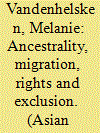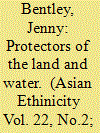| Srl | Item |
| 1 |
ID:
177551


|
|
|
|
|
| Summary/Abstract |
This is the introduction to a special issue of Asian Ethnicity that includes six papers on the issue of citizenship in the Indian state of Sikkim, from the perspectives of anthropology, political science, sociology and history. These contributions explore the entanglement of migration and ethnicity that defines political membership and exclusion in Sikkim, as it does in other parts of India. They give a central place to the consequences of the combination of the 1961 Sikkim Subject regulation (that remained valid after Sikkim became a part of India in 1975) and ‘group-differentiated citizenship’ in a context where Sikkim’s population – formed through people’s mobility within a region that has long been a crossroads between Nepal, Tibet, Bhutan and India – was brought into the frame of a territorial concept of the nation. These papers also explore the means used by people in Sikkim to contest their categorisation by the state.
|
|
|
|
|
|
|
|
|
|
|
|
|
|
|
|
| 2 |
ID:
177557


|
|
|
|
|
| Summary/Abstract |
In Sikkim, India, indigenous activists protesting against dams in their reserve, Dzongu, have turned ancestral territorial boundedness into a political resource and asserted that all Lepcha have stakes in Dzongu’s future, reconceptualising citizenship as not defined by the Indian government or the subnational states of Sikkim and West Bengal, but as deriving from the relations of the Lepcha to their ancestral territory that spans present-day borders. I analyse this reconceptualization and the strong local resistance against it along three modalities: the temporality of historical boundedness, the spatiality of the traditional territory, and the polysemy of territorial relations. I conclude that the indigenous cross-border claims failed to be sustained as political action due to the legacy of state institutions as welfare providers, the vulnerability of Sikkimese belonging, and the non-inclusion of local understandings of the sacred Dzongu landscape. This article contributes to the debate on polysemic territoriality, citizenship, resistance and vulnerability.
|
|
|
|
|
|
|
|
|
|
|
|
|
|
|
|